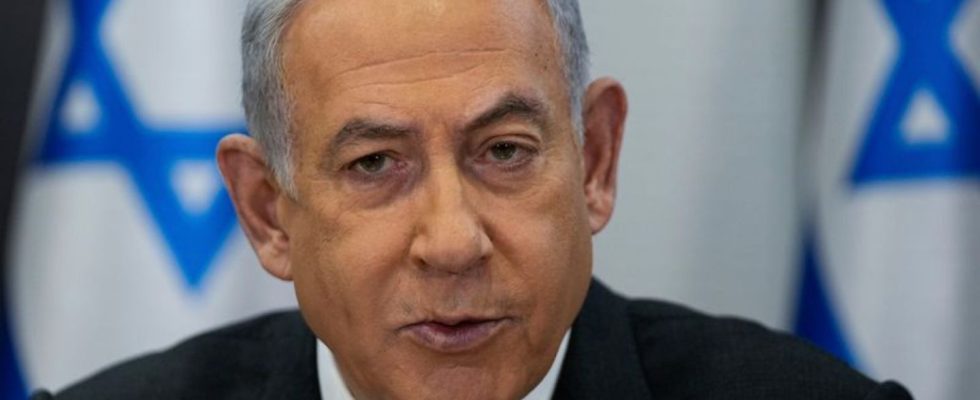The USA wants to show Israel alternatives for a ground offensive in Rafah. However, Israeli Prime Minister Netanyahu cannot be dissuaded from an offensive. The news at a glance.
Israeli Prime Minister Benjamin Netanyahu wants to resist pressure from the USA and is sticking to a ground offensive in the city of Rafah in the south of the Gaza Strip, which is currently overcrowded with refugees. In his telephone conversation with US President Joe Biden, he made it “unmistakably clear” that Israel was determined to destroy the last battalions of the Islamist Hamas in Rafah.
“There is no other option than to go in on the ground,” Netanyahu told the Israeli parliament’s Foreign Affairs and Defense Committee, the Times of Israel reported. In a conversation with Biden the day before, he agreed to his request to send a delegation to Washington in the coming days. According to a media report, the USA wants to show alternatives to a ground offensive.
USA wants to avoid massive casualties among civilians in Rafah
One idea is to postpone a military operation in the city of Rafah, which borders Egypt, and initially concentrate on stabilizing the humanitarian situation in the north of the sealed-off coastal area, the news portal “Axios” reported, citing two US officials. According to the United Nations, there is a risk of famine there.
The option would also include the construction of shelters for the civilian population to be evacuated from Rafah, wrote Axios. The aim is to reduce the potential for massive civilian casualties in an invasion of Rafah. Another idea is to concentrate in an initial phase on securing the Egyptian side of the border. This would be part of a plan by the US, Egypt and Israel to destroy tunnels under the border and create infrastructure that would prevent arms smuggling into the Gaza Strip, Axios reported, citing US officials.
Report: Israeli defense ministers and US plan meetings
In Rafah, it is estimated that 1.5 million of Gaza’s 2.2 million residents are currently seeking shelter in a small area from the fighting in other parts of the coastal area. The border crossing with Egypt, through which aid deliveries reach the Gaza Strip, is also located in Rafah.
“Axios” quoted Netanyahu as saying that they are ready for the meeting in Washington at the beginning of next week so that the US government can present its ideas to Israel, “particularly in the humanitarian area.” But he is still determined to complete the dismantling of Hamas and that can only be achieved with a ground offensive in Rafah.
Accordingly, Netanyahu is sending his minister Ron Dermer, security advisor Tzachi Hanegbi and a military representative responsible for humanitarian issues to Washington, but not army officers responsible for military planning of the operation in Rafah. US Defense Secretary Lloyd Austin will separately receive Israeli Defense Minister Joav Galant in Washington next week, US broadcaster CNN reported on Tuesday, citing a US Defense Department official.
Blinken: All of Gaza affected by acute food insecurity
According to US Secretary of State Antony Blinken, the entire population of the Gaza Strip is affected by acute food shortages. According to the most recognized assessments, “100 percent of the population in Gaza is suffering from severe acute food insecurity,” he said on Tuesday at the end of a visit to the Philippines. “This is the first time an entire population has been classified this way.” Blinken travels to Saudi Arabia on Wednesday and then to Egypt to discuss efforts for a temporary ceasefire and hostage release.
Report: Hardened fronts in ceasefire negotiations
However, in the negotiations conducted through mediators Qatar, Egypt and the USA, the goals of Israel and Hamas currently appear to be impossible to reconcile, the Wall Street Journal reported. While Israel insists on continuing the war after a cease-fire with the aim of destroying Hamas, Hamas is essentially negotiating for its survival and pushing for a permanent ceasefire and opportunities to remain influential, if no longer as ruler, in post-war Gaza .
The mediators see the ongoing talks as the last chance to reach a ceasefire before Israel’s Rafah offensive occurs, it said. Any attack on Rafah would hamper efforts to reach an agreement on a ceasefire and the release of more hostages, a Qatari foreign ministry spokesman warned.
Is Hamas leader al-Sinwar playing for time?
The head of the Israeli foreign intelligence service Mossad, David Barnea, traveled back home from Qatar on the same day to inform the war cabinet about the status of the ongoing negotiations there. According to the media, Barnea’s delegation is still in the capital Doha, where the talks brokered by Qatar, the USA and Egypt only resumed on Monday evening.
The discussions are expected to last one to two weeks. A senior Israeli official said they were pessimistic that an agreement could be reached, the Times of Israel reported. Although the differences could be bridged, it is not clear whether the Hamas leader in the Gaza Strip, Jihia al-Sinwar, is really seeking an agreement or is just playing for time to fend off the planned Israeli offensive on Rafah.

